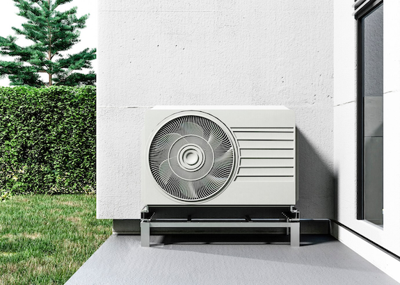
Canadians face challenges as the cost of living increases annually. In Toronto, for instance, the cost of living surged by 60 percent in a span of one year. Living expenses include housing, food, utilities, and transportation. This surge in costs highlights the financial pressures many Canadians face, necessitating the need for cost-saving solutions in daily life.
Saving money on energy in Ontario, for example, is a must. Rates in this area can go as high as 18.2 cents per kWh on peak hours. Finding an efficient way to heat and cool homes is essential in the Canadian climate, characterized by harsh winters and varied weather conditions.
The Cost-Effective Benefits of Heat Pumps
Heat pumps have cost-effective benefits, particularly in regions with varied climates like Canada. Here's what you're getting when you effectively manage your heating and cooling needs:
High energy efficiency
Heat pumps provide exceptional energy efficiency. Unlike the traditional heating system that generates heat by burning fuel, these pumps work by transferring heat from one place to another.
This method can provide about four times more heating or cooling energy than the electricity they consume. This efficiency is particularly advantageous in Canada, where heating costs can form a significant portion of your energy bills.
Dual functionality and cold climate compatibility
Heat pumps provide heating and cooling, eliminating the need for separate systems. This dual functionality simplifies your home's HVAC setup and can save you money. Technological advancements allowed the development of cold climate heat pumps, which can operate efficiently even in temperatures as low as -30°C.
Reduction in harmful emissions
Heat pumps significantly reduce greenhouse gas emissions by using electricity to transfer heat. They can lessen carbon emissions by up to 65 percent compared to traditional heating systems.
Low maintenance and quiet operation
Heat pumps are known for their low maintenance requirements and quiet operation. They have fewer moving parts, so almost no noise is produced when they are turned on. With this, there's a reduced risk of breakdowns, and homeowners never have to worry about high maintenance costs.
Cost Considerations and Rebates
The average cost of purchasing and installing a heat pump system in Canada is about $18,400. This figure, however, depends on several factors. It's worth noting that while this upfront cost is substantial, it is offset by long-term savings on energy bills.
The high efficiency of heat pumps, in contrast to traditional heating methods, is the primary driver of these savings. Additionally, the extended lifespan and low maintenance requirements further contribute to these savings over time, as discussed above.
Government rebates and incentives
To make heat pumps more accessible and encourage their adoption, the Canadian government has introduced various incentives and rebate programs.
Here are some of them:
Oil to Heat Pump Affordability Program
The OHPA program offers substantial financial assistance to eligible households. Initially, it provided up to $10,000, but this amount has been increased. Eligible households in co-delivery provinces can receive a federal grant of up to $15,000 and supplementary provincial grants.
They also get a one-time bonus payment of $250. This initiative aims to help low and median-income Canadian households transition from oil heating to electric cold-climate heat pumps.
To be eligible, homeowners must demonstrate that their home was oil-heated as of January 2023. They must show proof of their oil fuel bills from the last 12 months preceding their application. The program covers various costs associated with the transition. This includes:
purchasing and installing an eligible cold climate air source heat pump (ccASHP)
necessary electrical and mechanical upgrades
removal of the oil tank
installation of a backup electric heating system (if required)
Canada Greener Homes Grant
This grant financially supports homeowners undertaking energy-efficient home upgrades, including installing heat pumps. Homeowners can receive grants ranging from $125 to $5,000 to cover some of the costs for eligible home retrofits. These retrofits include various upgrades to improve energy efficiency and reduce environmental impact.
They can also get up to $600 as the maximum contribution toward the total costs of pre- and post-retrofit EnerGuide evaluations.
Regional programs
Besides federal programs, some provinces and territories may offer additional incentives or rebates specific to their regions. These programs often complement federal initiatives and can provide further financial relief to homeowners.
Impact of rebates on adoption
These government initiatives significantly reduce the initial financial barrier associated with heat pumps, enhancing their affordability. The rebates can cover a substantial portion of the upfront costs, making heat pumps a more viable option for many Canadian households.
These programs encourage the adoption of energy-efficient technologies. They also support the broader goal of reducing carbon emissions and reliance on harmful fuels for heating.
Make That Smart Investment With Heat Pumps
For Canadian homeowners, heat pumps represent a wise investment. They offer significant energy and cost savings and contribute to a greener, more sustainable future. With government programs further easing the financial burden, heat pumps are attractive options for efficient and eco-friendly home heating and cooling.


(0) comments
We welcome your comments
Log In
Post a comment as Guest
Keep it Clean. Please avoid obscene, vulgar, lewd, racist or sexually-oriented language.
PLEASE TURN OFF YOUR CAPS LOCK.
Don't Threaten. Threats of harming another person will not be tolerated.
Be Truthful. Don't knowingly lie about anyone or anything.
Be Nice. No racism, sexism or any sort of -ism that is degrading to another person.
Be Proactive. Use the 'Report' link on each comment to let us know of abusive posts.
Share with Us. We'd love to hear eyewitness accounts, the history behind an article.